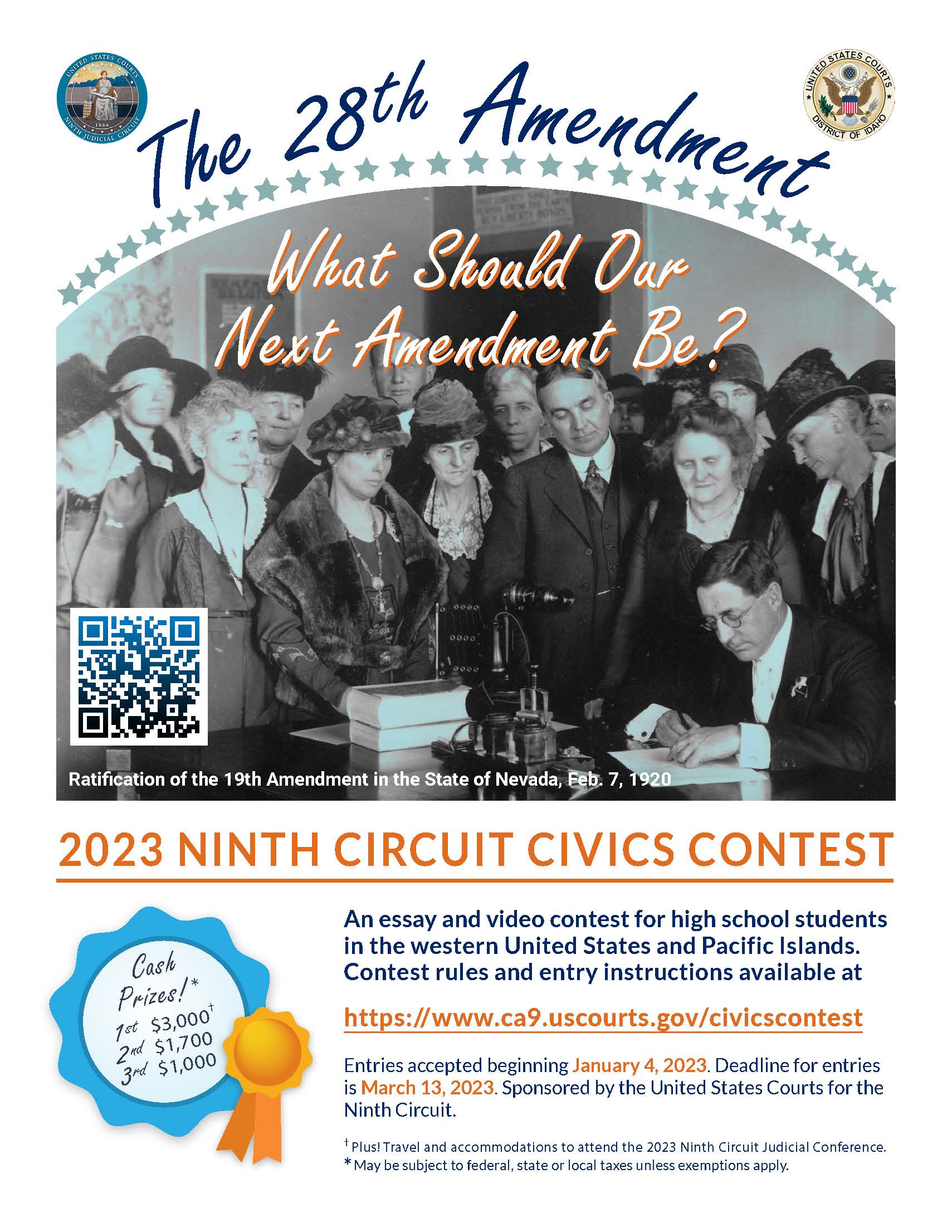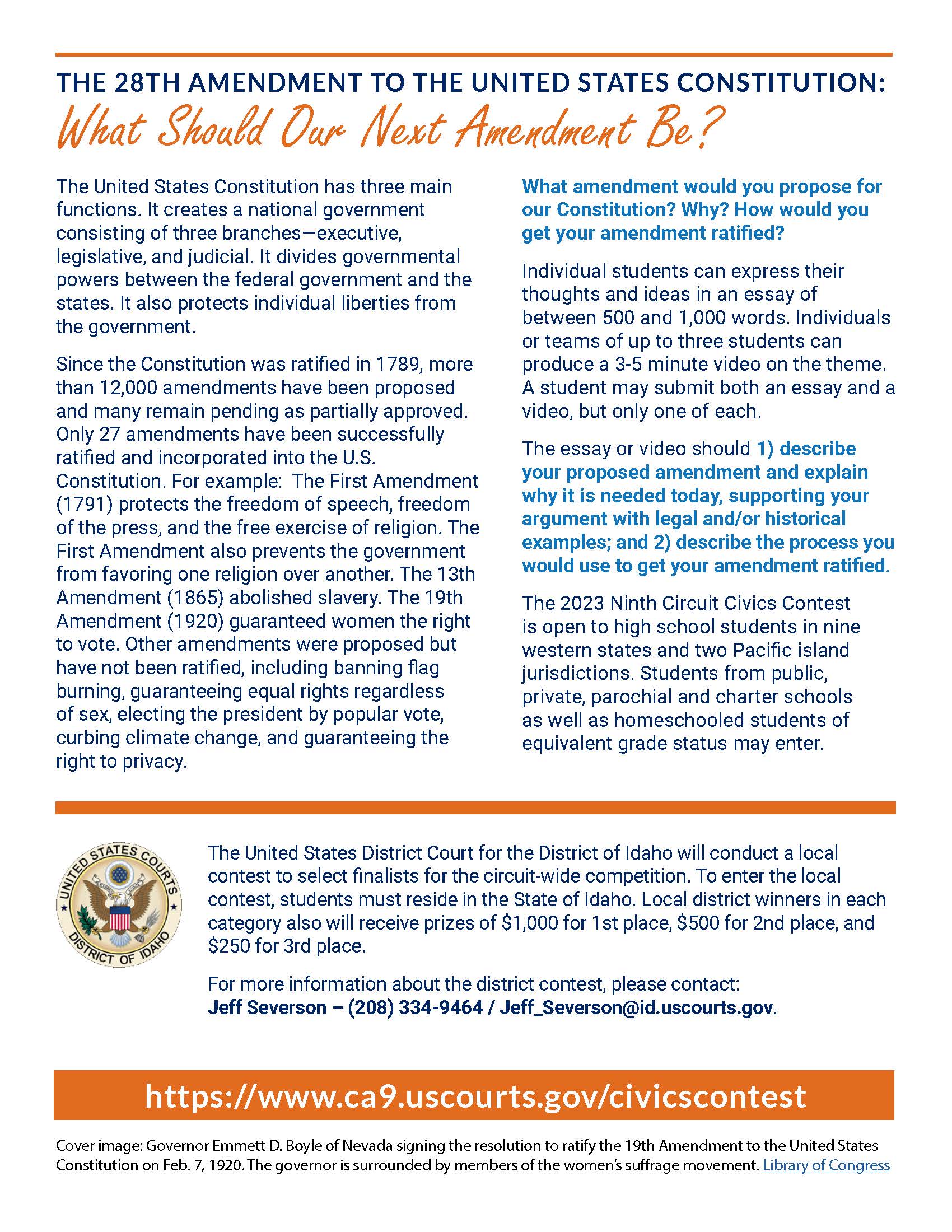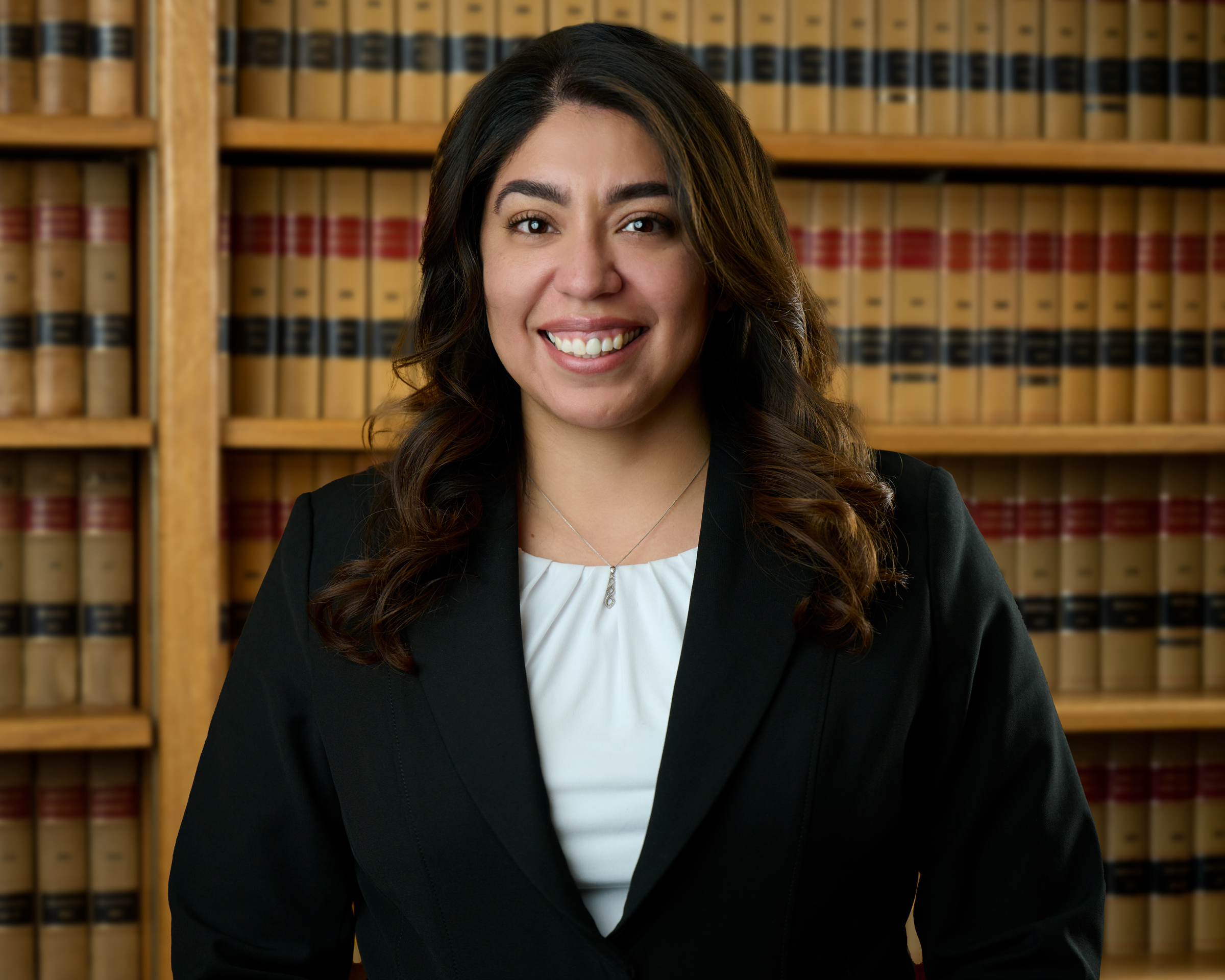Month: January 2023
MCLE Compliance Extension Deadline- 3/1
Each active member of the Bar must complete 30 hours of MCLE credit, including 3 hours of ethics, every three (3) years. Extensions until March 1, 2023 are available. The extension fee is $100. More information on MCLE Compliance.
If there are credits that need to be added to your records please use our MCLE Application Form or MCLE Attendance Form
If your MCLE reporting period ends in 2022, please remember live webcasts qualify for live credit. Search for ISB/ILF live courses on our website by clicking here. These include webcast, audio streams and in-person courses. To search by topic for ISB/ILF on-demand courses that qualify as self-study, please click here. You can search for other Idaho-approved CLE courses developed by other course providers here.
Out of State Reporting
Under Idaho Bar Commission Rule (IBCR) 408, an Idaho State Bar member whose principal office for the practice of law is in another state may use their MCLE compliance from the other state to meet the Idaho MCLE requirements if the attorney meets the Reporting Requirements listed below.
Qualifications. An attorney whose principal office for the practice of law is not in Idaho may comply with the Idaho MCLE requirements by filing a compliance report, on a form prescribed by the Board, certifying that:
- The attorney is subject to the mandatory CLE credit requirements in the jurisdiction where his or her principal office for the practice of law is located;
- The attorney complied with that jurisdiction’s mandatory CLE requirements within the past three (3) years by submission and approval of the required credits; and
- The attorney is currently in compliance with the mandatory CLE credit requirements in that jurisdiction.
Certificate of Compliance. An attorney submitting a compliance report from another state must provide a mandatory CLE certificate of compliance, or similar verification, from the other jurisdiction that includes the following information:
- Confirmation that the attorney is in compliance with the mandatory CLE requirements;
- The attorney’s current mandatory CLE reporting period;
- The date that the attorney’s previous mandatory CLE reporting period ended; and
- Confirmation that the attorney complied with the mandatory CLE requirements by submission of approved credits during the previous reporting period.
Use our online Licensing Forms Upload to submit these completed forms.
Exceptions.
- Satisfaction of CLE requirements in Alaska or Hawaii does not satisfy Idaho’s mandatory CLE requirements.
- Attorneys licensed in other jurisdictions are not exempted from the New Admittee Education requirements.
- Attorneys claiming specialty certification shall comply with the requirements of the applicable certifying organization for completion of CLE credits in the specialty area.
- Attorneys who transferred to Active status under IBCR 306 shall comply with the CLE requirements applicable to the Transfer.
For more information, view the Idaho Bar Commission Rules Section IV.
Idaho Supreme Court Amendment to Idaho Criminal Rules, Appendix A – Effective January 27
The Idaho Supreme Court has issued an Amendment to the Idaho Court Criminal Rules, Appendix A. Please read the full Order linked below.
2023 Final Licensing & MCLE Deadline – 3/1
The 2023 licensing & MCLE final deadline is March 1, 2023
The License Fee Notice – Why should you review it? In addition to the license fee information, the license fee notice includes attorney data from the Bar’s records. Please review the information provided and make any changes so your information is accurate.
Do you have a Trust Account? Active members must complete the Trust Account Certification form regardless of whether you are required to maintain a trust account. If you are an active member of the Idaho State Bar and your primary office is in Idaho, you must certify each year that you maintain a separate client trust account for Idaho client funds or that you handle no client funds. If you have a trust account, please make sure the account is reported accurately.
MCLE – Each active member of the Bar must complete 30 hours of MCLE credit, including 3 hours of ethics, every three years. If your MCLE reporting period ends in 2022, please remember live webcasts qualify for live credit. Search for live courses on our website and look for notices such as “Webcast,” “Teleconference,” or “Audio Stream.” Extensions until March 1, 2023 are available. The extension fee is $100. More information on MCLE Compliance.
Are you required to have malpractice coverage? All active and house counsel members must complete the Professional Liability Insurance Coverage Certification. If you do not represent private clients, complete the form, indicating you do not represent private clients. If you represent private clients, complete the form, and submit proof of current professional liability coverage if it is not already on file with the Idaho State Bar.
You have decided to resign from the Idaho State Bar – If you decide not to practice law in Idaho, now or in the future, you can complete the Voluntary Resignation Form. Please understand, if you resign and then change your mind later, you must reapply for admission to the Idaho State Bar, which may include taking and passing the Idaho Bar Examination. If you are unsure of your future plans to practice law in Idaho, we recommend you transfer to inactive or senior status.
Practice Sections – Should you join? The Bar’s 23 Practice Sections offer you the opportunity to meet Bar members who practice in similar areas of practice, attend educational events, and provide a chance to participate in projects and activities. The license form includes Section registration information.
Donations to the Idaho Law Foundation – The license form offers you the opportunity to make a voluntary tax-deductible contribution to the Idaho Law Foundation (“ILF”). ILF, through its programs, provides services and information to thousands of individuals, groups, and families in Idaho, including low-income families needing legal assistance, justice professionals, community leaders, students, educators, law students, attorneys, judges, and the public. For more information about ILF visit www.idaholawfoundation.org.
Licensing Questions – Detailed instructions and information are included on the online licensing portal, in the licensing packet, and on the Bar’s website. If you have questions, please contact the Licensing Department at licensing@isb.idaho.gov 208-334-4500.
Idaho Code Commission Position Opening – Deadline 2/14
Pursuant to Idaho Code Section 73-203, the Board of Commissioners of the Idaho State Bar are responsible for nominating bar members to serve on the Idaho Code Commission. The appointments are made by the Governor for six-year terms. The term of one of the Code Commissioners expired on December 1, 2022. The bar is seeking attorneys interested in the position. If you are interested in serving on the Code Commission, please submit a letter of interest and a current bio to the ISB executive director Diane Minnich, dminnich@isb.idaho.gov, by February 14, 2023. For information on the duties and responsibilities of the Code Commission contact Andy Doman, Code Commission chair or Phil McGrane, Idaho Secretary of State.
Access to Fastcase While System is Temporarily Down
Idaho State Bar members may notice that the link to Fastcase on our website is temporarily rerouting to a page that is not allowing access to accounts. Fastcase is working on resolving this issue. In the meantime, Fastcase members can sign up for a trial account here: Fastcase Gateway
This will provide immediate access to Fastcase, but as it is a separate account you will not have access to their history or folders.
We apologize for any inconvenience and hope to have this issue fixed soon.
2023 District of Idaho/Ninth Circuit Civics Contest – Deadline 3/13
2023 District of Idaho/Ninth Circuit Civics Contest – Entry Deadline March 13th
This year’s District of Idaho Civics Contest is officially underway with entries due March 13th. Sponsored by the United States Courts for the District of Idaho, this essay and video contest is open to high school students in the State of Idaho. This year’s topic? The 28th Amendment to the United States Constitution: What Should Our Next Amendment Be? Individual students can express their thoughts and ideas in an essay of between 500 and 1,000 words. Alternatively, individuals or team of up to three students can produce a three- to fine-minute video. A student may submit both an essay and a video, but only one of each. Entries are due Monday, March 13, 2023. For more information about the contest, including the cash prizes available, visit https://id.uscourts.gov/clerks/2023_Civics_Contest.cfm.


Proposed Amendments to Idaho Juvenile Rules – Public Comment Deadline 1/25
For public comment, attached are proposed revisions to the Idaho Juvenile Rules with a corresponding explanation below.
Amendments to Idaho Misdemeanor Criminal Rule 13(b), Effective January 4
Please see attached Amendments
ILF President’s Message: Setting Course for a New Year

Fonda L. Jovick
President
Idaho Law Foundation
Happy New Year to you and your loved ones! In July, I began my term as President of the Idaho Law Foundation, taking over for Kari Campos. It’s an honor to serve in this role and I want to thank Kari for setting such a great example of what it means to be a strong leader for the Idaho Law Foundation.
I love this time of year. For me it always feels like the one time of the year when we look back and forward at the same time. We wrap up a period of celebration and set course for the new year ahead of us.
As we take stock of our year at the Foundation, we have a lot to be proud of. We have achieved so much more than I could reasonably share in this article but here are some highlights from our most recent annual report:
- 654 donors gave $146,147 to the Foundation and our programs
- 541 volunteers served 6,770 volunteer hours
- The Idaho Volunteer Lawyers Program processed 2,800 requests for pro bono legal services, opened 582 cases, and provided legal services for 516 individuals and families
- Law Related Education hosted a Constitution Day Event attended by 420 people including 118 attorneys, 27 non-attorney community members, and 275 students from 15 schools
When I use the word “we” in the context of Law Foundation accomplishments I include all Idaho attorneys. As you may know, attorneys licensed to practice law in Idaho are also members of the Idaho Law Foundation. Those of us who work for and with the Foundation do what we do both for our legal community and because of our legal community. So, thank you to all of you who continue to support our work.
As lawyers, it’s a key part of our profession to rely on evidence. Working to shine a light on the facts is a staple of what we do. For me, it’s important that I apply those same concepts to other parts of my life, reviewing important data as it relates to the work we do at the Foundation. Here are a couple important statistics to consider:
- The Legal Services Corporation reports that each year 74% of low-income households experience at least one civil legal issue and 92% are not able to access the help they need.
- The Annenberg Public Policy Center found that students who participate in civic education activities have significantly higher understanding of how our government and legal system impact their lives.
I realize that this is fairly dry information, but it’s important to share as a way to point out that the Idaho Law Foundation is one organization that is working to provide solutions to these societal issues. It’s right there in our mission: The Idaho Law Foundation supports the right of all people to live in a peaceful community through increasing access to civil legal services and enhancing public understanding of the law and our legal system.
This mission is always at the forefront of everything we do. It guides what we have done in years past and will frame our work in the year to come.
In 2023, the Idaho Volunteer Lawyers Program (“IVLP”) will continue their work to close the justice gap by creating access to civil legal services for low-income individuals and families who cannot afford legal representation. IVLP will build on their solid and proven track record for matching pro bono attorneys with people in need of direct legal representation and grow their legal clinic model. They will also work to innovate how they provide services through activities like the new Emeritus Program developed in partnership with the Idaho Supreme Court to engage retired attorneys in meaningful pro bono activities.
In the year to come, Law Related Education (“LRE”) will continue to bolster civic education in Idaho. From mock trial to Constitution Day to our popular 18 in Idaho publication and website, LRE will ensure that Idaho students have access to better understand the law and our legal system. In 2023, LRE has plans to extend our mock trial program to middle school and is partnering with DisAbility Rights Idaho to ensure our materials include information for Idahoans with disabilities.
As it is in every year, I am confident that Law Foundation programs will work diligently to support our mission. And of course, we know that we can rely on you, our Idaho attorneys, as our partners in this important work. To that end, we ask that you consider supporting our programs. You can donate when you fill out your annual licensing form or visit us online at idaholawfoundation.org to donate or sign up to volunteer for one of our programs
As I sit here considering both the past and future of the Idaho Law Foundation, I can share that I am proud to be part of an organization that does such good work in all parts of Idaho. It’s a joy and honor to get to work with the staff, Board, and volunteers who participate in the Foundation. As we set course for the year to come, I invite you to be part of it.
If you have any questions about the Foundation or our programs, contact Carey Shoufler at cshoufler@isb.idaho.gov.

Fonda Jovick is President of the Idaho Law Foundation. She graduated from Gonzaga University School of Law and is a founding member and managing partner at Lake City Law in Coeur d’Alene. Her practice focuses on estate planning, probate, and trust work as well as representing municipalities and governmental entities in addition to maintaining a mediation practice.
Home is… Where?
Jessica Perez

The Uniform Child Custody Jurisdiction and Enforcement Act (“UCCJEA”)[i] is a familiar friend to all family law practitioners. It is the heart of a state’s ability to make a child custody determination. On one hand, the UCCJEA is a well-organized statute broken up into four parts. The General Provisions govern definitions, appearance, limited immunity, etc. The Jurisdictional provisions govern initial child custody jurisdiction, temporary emergency jurisdiction, simultaneous proceedings, and exclusive, continuing jurisdiction, as well as numerous other issues.
The Enforcement provisions include registration of a child custody determination from out of state, recognition and enforcement of an out-of-state custody determination, and more. Finally, the UCCJEA gives us the short Miscellaneous Provisions, which includes the application and construction of the statute, a severability clause, and transitional provision. Each of those four parts is critical for its own reason. At some point, each family law practitioner has, or will, come across a case whose facts will trigger different and/or multiple sections of the UCCJEA.
On the other hand, the provisions of the UCCJEA can be very nuanced. The most common and usually the first question is, where is the child’s home state? This question sounds fairly basic but in actual practice it can be incredibly difficult to pinpoint where the child’s home state is. This question is crucial to answer because in order to know where to file your divorce or custody action, you must establish which state has initial jurisdiction to make and enter a final child custody determination.
To do that, you must answer that first question, where is home or more specifically, where is there home state jurisdiction? This can lead to jurisdictional fights before a divorce or custody action has even taken off. Jurisdictional issues are particularly common along those Idaho towns that share a border with a neighboring state.
In order to really put the UCCJEA and the importance of understanding home state jurisdiction into context, it is helpful to look at a hypothetical. Say you consult with Husband, Viz; you ask your detailed questions and discover that he and Wife, Wanda, have been separated for a year. Wanda moved to Idaho at that time and has been working in the healthcare industry in Idaho. Viz remained in Oregon but is an engineer in Idaho. The parties have real property in Oregon. The twin minor children, Billy and Tommy, age two, have been going back and forth between states in a manner that you believe either state could exercise home state jurisdiction.
Daycare is in Oregon as are the majority of the extended family members. Idaho has a presumption in favor of joint custody, whereas Oregon courts cannot award joint custody unless the parties agree to joint custody. Perhaps the facts of that consult lead you to believe that sole custody for Viz would be in the children’s best interest. There’s also the fact that Idaho is a community property state and Oregon is not (for our purposes here, that is an issue for another time). Additionally, it would just be easier to deal with the divorce assets in an Oregon Court. The bad news is, Wanda has already retained counsel and filed for divorce in Idaho.
The consult, the questions, and where to start
Initial child custody jurisdiction is set forth in Idaho Code 32-11-201(a), which provides, in relevant part, as follows:
“(a) [A] court of this state has jurisdiction to make an initial child custody determination only if: (1) This state is the home state of the child on the date of the commencement of the proceeding, or was the home state of the child within six (6) months before the commencement of the proceeding and the child is absent from this state but a parent or person acting as a parent continues to live in this state[.]”
What is this “home state” that section (a)(1) is talking about? The definitions section in I.C. 32-11-102(g) tells us that home state is “the state in which a child lived with a parent or a person acting as a parent for at least six (6) consecutive months immediately before the commencement of a child custody proceeding.” This is where math comes into play. Fortunately for us attorneys, it’s pretty simple math. For children less than six months old home state “means the state in which the child lived from birth with any of the persons mentioned.” Id.
Determining where the child has lived for the purpose of home state jurisdiction means attorneys should look back to six months from the date they are planning on filing their petition and ask their client lots of questions. Questions such as where the child or children have been within that timeframe, on what dates, for how long, and what their connection is with the previous state (if any). The connections to the other state can be anything from where the children go to school, where are their doctors, to whether they are members of a club in another state.
Since the UCCJEA is adopted in all states, these same rules apply across the board. Remember, I.C. 32-11-201(a)(1) says Idaho is the “home state of the child within six months before the commencement of a proceeding and the child is absent from this state but a parent…continues to live in this state.” It does neither party or the attorney any good to file in Idaho on behalf of the Idaho parent if the minor child had been equally in Oregon and the other parent still resides in Oregon, and the child is more connected to Oregon. That Oregon parent is also looking at their state’s UCCJEA and thinking, “well, is it not obvious that even though the minor child is absent from this state, I am still here and so Idaho should not have home state jurisdiction?” Or maybe the Oregon attorney is thinking that for their client?
Of course, if your client is telling you the child has been in Idaho his or her entire life, this is not an issue. On the other hand, if your client is telling you that the other party lives in Oregon, or perhaps your client moved to Idaho only a few months ago and the parties are sort of doing their own parenting plan and the child is going from Idaho to Oregon (or Utah or Washington) every so often, then you know right out of the gate that you should do your due diligence and make sure you are asking the right questions and filing in the appropriate state. This can be as simple as pulling out a calendar and adding up the days the child or children have been in Idaho. In some instances, that may lead to a split that could go either way in favor of Idaho having home state jurisdiction.
The argument for declining jurisdiction
Even if Idaho is not the home state, Idaho can potentially still make an initial child custody determination. This scenario is provided for in I.C. 32-11-201(a)(2), which provides that Idaho may exercise initial child custody jurisdiction when:
“A court of another state does not have jurisdiction under paragraph (1) of this subsection, or a court of the home state of the child has declined to exercise jurisdiction on the ground that this state is the more appropriate forum under section 32-11-207 or 32-11-208, Idaho Code, and: (A) The child and the child’s parents, or the child and at least one (1) parent or a person acting as a parent, have a significant connection with this state other than mere physical presence; and (B) Substantial evidence is available in this state concerning the child’s care, protection, training and personal relationships.”
In cases where home state jurisdiction is in question, once the other state that could exercise home state jurisdiction has entered an order declining jurisdiction based on Idaho being a more appropriate or convenient forum, then Idaho can safely exercise initial child custody jurisdiction. Only then can Idaho make and enter a child custody determination.
Knowing these little nuances can also help an attorney attack jurisdiction on the Idaho side as well. While we all enjoy practicing in Idaho, for one reason or another you might decide that it’s best for your client’s case and in the best interest of the child that your client file in a different state. This could be for any number of reasons, such as the law in the other potential home state may be more favorable to your client, or simply because you’ve looked back those six months and determined there is no way Idaho is the home state. In the case of the law of another state being more favorable you would of course want Idaho to decline jurisdiction. This is where being licensed in that other state or even having a colleague to call and discuss the jurisdictional issue with is helpful.
In these situations, it also becomes evident that sometimes, especially in a divorce matter, the home state issue and where you are going to challenge jurisdiction is heavily influenced by the parties’ assets or where it might be easier to get an order for spousal support. This is not to say that any of these reasons should undercut your ability to look at what is in the best interest of the child.
Let’s return to Viz and Wanda. For Viz and the best interest of the children, you need Idaho to decline jurisdiction and enter an order that the other state is the more convenient forum. Idaho Code 32-11-207 allows the Idaho courts to analyze certain factors in order to decline jurisdiction based on Idaho being an inconvenient forum. In order for the court to determine that it is an inconvenient forum, it must first decide that another state – Oregon in our couple’s scenario – is an appropriate state to exercise jurisdiction.
To do that, the UCCJEA has provided a list of factors for the court to analyze. That non-exhaustive list includes: (1) Whether domestic violence has occurred and is likely to continue in the future and which state could best protect the parties and the child; (2) The length of time the child has resided outside this state; (3) The distance between the court in this state and the court in the state that would assume jurisdiction; (4) The relative financial circumstances of the parties; (5) Any agreement of the parties as to which state should assume jurisdiction; (6) The nature and location of the evidence required to resolve the pending litigation, including testimony of the child; (7) The ability of the court of each state to decide the issue expeditiously and the procedures necessary to present the evidence; and (8) The familiarity of the court of each state with the facts and issues in the pending litigation.
All those detailed questions and digging into the connection between the child and the state are going to pay off at this point. Now is your chance to tell the court about those connections as they relate to the I.C. 32-11-207 factors, and Oregon being the child’s home state for the purpose of entering a child custody determination.
The argument for retaining jurisdiction in Idaho
If you represent Wanda in this scenario, you want Idaho to keep jurisdiction. You are arguing that Idaho is in fact the home state and it should exercise home state jurisdiction. Even if the other state could exercise jurisdiction, Idaho is the more convenient forum for our case.
Let’s say you discover there is also a piece of real property in Idaho, or maybe the majority of both parties’ extended family members are in Idaho. Since Idaho courts can decline to exercise its jurisdiction, these types of facts are crucial in persuading the judge that another state is not a more appropriate forum. Idaho Code 32-11-207(b) tells us that Idaho courts must consider whether a court of another state is the more appropriate forum before declining jurisdiction.
Idaho courts need to be able to point to the evidence and back up their analysis on why Idaho has jurisdiction to make a child custody determination under the UCCJEA. As Wanda’s attorney, you are still using those 32-11-207 factors to analyze the evidence and the facts in a way that demonstrates that the Idaho court has the stronger position and should not decline jurisdiction or find that Oregon is the more convenient forum.
Alternatively, suppose Viz filed in Oregon first and Wanda successfully challenged Oregon’s jurisdiction. As Wanda’s Idaho attorney, you are going to want to show the Idaho Court that Oregon has already entered an order declining jurisdiction. This goes back to I.C. 32-11-201(a)(2)(A)-(B). However, Idaho courts will also be looking for evidence that the children, or at least one of the parents has a “significant connection” with Idaho, something that is more than just “mere physical presence.” Id. Additionally, the court will need to see that “substantial evidence is available in [Idaho] concerning the children’s care, protection, training and personal relationships.” Id.
All those initial questions that you ask your client are going to be helpful regardless of which side you are on. We know both parties work in Idaho and Wanda has established a residence in Idaho for a year. You can therefore use the I.C. 32-11-207 factors as a guide to demonstrate on Wanda’s side, why Idaho has jurisdiction to make the child custody determination. Ultimately, in our couple’s scenario, regardless of who you represent, the children’s home is where the evidence and more persuasive argument say it is. There are many different facts that can change a case and change the connection to the state that will then impact what is considered the child’s home state. It is crucial that attorneys ask those questions about the connection to the state when there is a move involved or when there is any hint that there may be an issue determining where the child’s home is for the purposes of UCCJEA. As we’ve just seen, a child’s home is a fact-specific inquiry.
[i] The UCCJEA is codified in Idaho Code 32-11-101 to 32-11-405. All references to the Idaho Code are also references to the UCCJEA.

Jessica Perez is an attorney at Logan & Copple, P.C. She worked as a family law paralegal for about nine years, the experience of which has been invaluable to her practice. Her practice now focuses primarily on Idaho and Oregon family law. Jessica enjoys spending her free time with her family and her dogs.
 Official Government Website
Official Government Website
